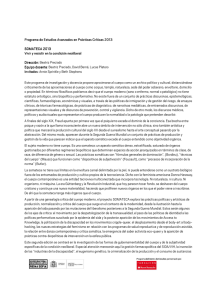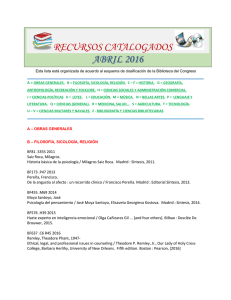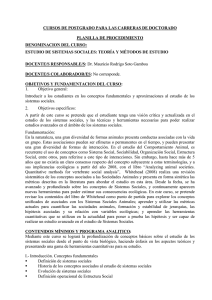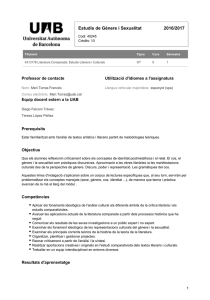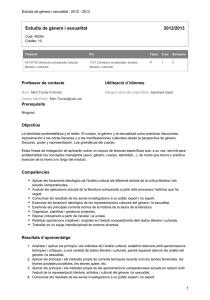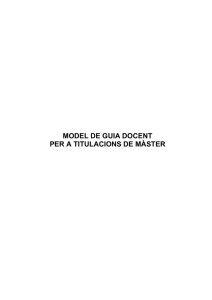Somateca. Producción biopolítica, feminismos, prácticas queer y trans Bibliografía programa
Anuncio
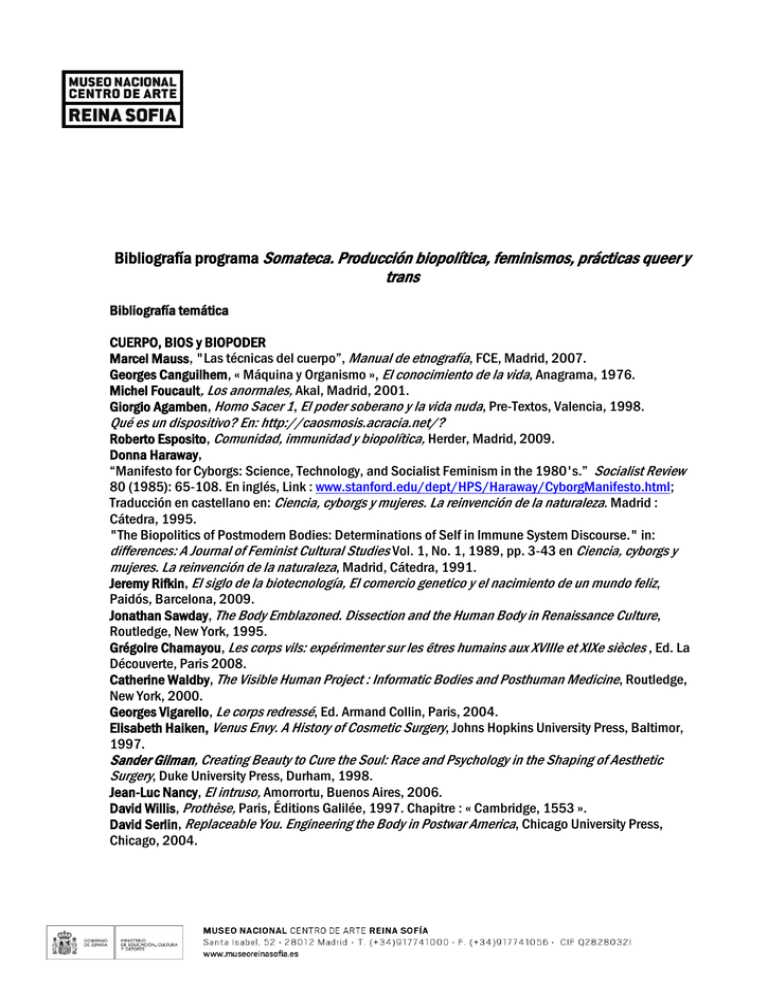
Bibliografía programa Somateca. Producción biopolítica, feminismos, prácticas queer y trans Bibliografía temática CUERPO, BIOS y BIOPODER Marcel Mauss, "Las técnicas del cuerpo”, Manual de etnografía, FCE, Madrid, 2007. Georges Canguilhem, « Máquina y Organismo », El conocimiento de la vida, Anagrama, 1976. Michel Foucault, Los anormales, Akal, Madrid, 2001. Giorgio Agamben, Homo Sacer 1, El poder soberano y la vida nuda, Pre-Textos, Valencia, 1998. Qué es un dispositivo? En: http://caosmosis.acracia.net/? Roberto Esposito, Comunidad, immunidad y biopolítica, Herder, Madrid, 2009. Donna Haraway, “Manifesto for Cyborgs: Science, Technology, and Socialist Feminism in the 1980's.” Socialist Review 80 (1985): 65-108. En inglés, Link : www.stanford.edu/dept/HPS/Haraway/CyborgManifesto.html; Traducción en castellano en: Ciencia, cyborgs y mujeres. La reinvención de la naturaleza. Madrid : Cátedra, 1995. "The Biopolitics of Postmodern Bodies: Determinations of Self in Immune System Discourse." in: differences: A Journal of Feminist Cultural Studies Vol. 1, No. 1, 1989, pp. 3-43 en Ciencia, cyborgs y mujeres. La reinvención de la naturaleza, Madrid, Cátedra, 1991. Jeremy Rifkin, El siglo de la biotecnología, El comercio genetico y el nacimiento de un mundo feliz, Paidós, Barcelona, 2009. Jonathan Sawday, The Body Emblazoned. Dissection and the Human Body in Renaissance Culture, Routledge, New York, 1995. Grégoire Chamayou, Les corps vils: expérimenter sur les êtres humains aux XVIIIe et XIXe siècles , Ed. La Découverte, Paris 2008. Catherine Waldby, The Visible Human Project : Informatic Bodies and Posthuman Medicine, Routledge, New York, 2000. Georges Vigarello, Le corps redressé, Ed. Armand Collin, Paris, 2004. Elisabeth Haiken, Venus Envy. A History of Cosmetic Surgery, Johns Hopkins University Press, Baltimor, 1997. Sander Gilman, Creating Beauty to Cure the Soul: Race and Psychology in the Shaping of Aesthetic Surgery, Duke University Press, Durham, 1998. Jean-Luc Nancy, El intruso, Amorrortu, Buenos Aires, 2006. David Willis, Prothèse, Paris, Éditions Galilée, 1997. Chapitre : « Cambridge, 1553 ». David Serlin, Replaceable You. Engineering the Body in Postwar America, Chicago University Press, Chicago, 2004. SubRosa, “Cell Track: Contesting the Appropiation of Life Material”, Unpublished draft, 2010. Claire Pentecost, “Outfitting the Laboratory of the Symbolic: Towards a Critical Inventory of BioArt”, Tactical Biopolitics, MIT Press, Cambridge MA, 2009. Catherine Malabou, ¿Qué hacer con nuestro cerebro? Arena Libros, 2007. Ed Cohen, A Body Worth Defending : Immunity, Biopolitics and the Apotheosis of the Modern Body, Duke UP, Durham, 2011. Cindy Patton, Inventing Aids, Routledge, New York, 1990. Globalizing Aids: Theory out of Bounds, University of Minnesota Press, Minneapolis, 2002. HISTORIA POLÍTICA DE LA SEXUALIDAD Alfred Binet, Le Fétichisme dans l’amour, Paris, 1887. Sigmund Freud, « Fetichismo », 1927. Michel Foucault, Historia de la Sexualidad, 1. La voluntad de saber, Siglo XXI, Madrid, 1992. Thomas Laqueur, La construcción del sexo. Cuerpo y género desde los griegos hasta Freud. Madrid, Cátedra, 1994. Erving Goffman, « The arrangement between the sexes » (1977), The Goffman Reader, Wiley-Blackwell, 1997. Anne Fausto-Sterling, Sexing the Body. Gender politics and the construction of sexuality, Basic Books, New York, 2000. Joanne Meyerowitz, How Sex Changed. A History of Transsexuality in the United States, Harvard U.P., Cambridge, MA., 2002. Londa Schiebinger, ¿Tiene sexo la mente? Ed. Cátedra, Madrid, 2004. Beatriz Preciado, Testo Yonqui, Espasa Calpe, Madrid, 2008. Emily Martin, “The Egg and the Sperm: How Science has Constructed A Romance Based on Sterotypical Male-Female Roles”, Journal of Women in Culture and Society, 1991, vol. 16, n. 3, pp. 485-501. FEMINISMO y CRÍTICA ANTICOLONIAL Angela Davis, Mujeres, clase, raza, Akal, Madrid, 2004. Gayatri C. Spivak, « Puede hablar el subalterno », En : http://caosmosis.acracia.net/wpcontent/uploads/2007/08/spivak_puede_hablar_lo_subalterno.pdf Gloria Anzaldúa, Borderline. La Frontera, The New Mestiza, Aunt Lute Books, San Francisco, 1987. Bell Hooks, Avater Brah, Chela Sandoval, Gloria Anzaldúa, Otras inapropiables. Feminismos desde las fronteras, Madrid, Traficantes de sueños, Mapas, 2004. The Black Feminist Reader, Edited by Joy James and T. Denean Sharpley-Whiting, Blackwell, MA, 2000. Sander J. Gilman, Freud, Race, and Gender, Princeton University Press, New York, 1993. Maria Mies, “Colonization and Housewifization”, (1987) in Material Feminism, A Reader in Class, Difference, and Women’s Lives, Edited by Rosemary Hennessy and Chrys Ingraham, Routledge, New York, 1997. Evelynn M. Hammonds, « New Technologies of Race », Processed Lives. Gender and Technology in the Everyday Life, Edited by Jennifer Terry and Melodie Calvert, Routledge, New York, 1997. Walter Mignolo, Historias locales. Diseños globales. Colonialidad, Conocimientos Subalternos y Pensamiento Fronterizo, Akal, Madrid, 2011. Elsa Dorlin, La Matrice de la Race. Généalogie sexuelle et coloniale de la nation française, La Découverte, Paris, 2009. TEORIA QUEER y POLITICAS PERFORMATIVAS Joan Riviere, “La feminidad como mascarada”, Atenea digital, 2007. (1929) J. L. Austin, How to do things with words, (1954) Quand dire c’est faire, Points, Paris, 1991. Jacques Derrrida, Marges de la Philosophie, Paris, Minuit, 1972. Chapitre : "Signature Événement Contexte." Judith Butler, El género en disputa, El feminismo y la subversión de la identidad, Paidós, Barcelona, 2001. Lenguaje, poder, identidad, Síntesis, Madrid, 2004. Vida precaria. El poder del duelo y de la violencia, Paidós, Barcelona, 2006. El grito de Antígona, El Roure, Barcelona, 2001. Deshacer el género, Paidós, Barcelona, 2007. Judith Butler , S. Zizek y E. Laclau. Contingencia, hegemonía y universalidad, Fondo de Cultura Económica, México, 2003. Teresa de Lauretis, Technologies of Gender: Essays on Theory, Film and Fiction, Bloomington, Indiana University Press, 1984. Figures of resistance. Essays in Feminist Theory, Illinois U. P., Chicago, 2007. FEMINISMO, MINORIAS SEXUALES, LUCHAS CONTRA-BIOPOLÍTICAS Simone de Beauvoir, El Segundo sexo, Siglo XX, Buenos Aires,1975. Guy Hocquenhem, El deseo homosexual, Melusina, Barcelona, 2009. René Schérer, Émile perverti, Paris, 1974. Chap. 1. “Sous l’oeil du maître”. Monique Wittig, El pensamiento heterosexual, Egales, Madrid, 2005. Gayle Rubin et al. “El tráfico de mujeres: notas sobre la economía política del sexo”, Nueva Antropología, México, Edición digital: http://www.juridicas.unam.mx/publica/librev/rev/nuant/cont/30/cnt/cnt7.pdf Silvia Federici, Calibán y la bruja. Mujeres, cuerpo y acumulación originaria, Traficantes de sueños, 2010. “Feminism and the politics of the commons”, http://www.commoner.org.uk/wpcontent/uploads/2011/01/federici-feminism-and-the-politics-of-commons.pdf “The Debt Crisis, Africa and the New Enclosures”, http://www.commoner.org.uk/02federici.pdf Lynda Hart, Between the Body and the Flesh. Performing Sadomasochism, New York, Columbia University Press, 1998. Gail Pheterson, Nosotras, las putas, Talasa, Madrid, 1992. Carol S. Vance, Placer y peligro, Talasa, Madrid, 1989. Michel Warner, Fear of a queer planet. Queer Politics and Social Theory, University of Minnesota Press, Minneapolis, 1993. Raquel Platero, Ed. Lesbianas. Discursos y Representaciones, Melusina, Barcelona, 2008. Douglas Crimp, AIDS: Cultural Analysis/Cultural Activism, The MIT, 1988. Steven Epstein, Impure Science. AIDS, Activism, and the politics of knowledge, University of California, Berkeley, 1996. Paula A. Treichler, How to Have Theory in an Epidemic: Cultural Chronicles of Aids, Duke University Press, Durham, 1999. Manifiestos gays, lesbianos y queer, Testimonios de una lucha 1969-1994, Editado por Rafael Mérida Jiménez, Icaria, Barcelona, 2009. ESTETICAS Y POLITICAS QUEER Susan Sontag, "Notas sobre el Camp," (1964) Contra la interpretación, Alfaguara, 2005. Esther Newton, Mother Camp: Female Impersonation in America, Chicago, Chicago University Press, 1962, "Roles Models". Richard Dyer, “It’s being so camp that keep us going”, in The Culture of Queer, London, Routledge, 2002, Chapter 4, pp.49-63. Judith Halberstam, Masculinidad femenina, Egales, Madrid, 2007. Judith Halberstam y Del La Grace Volcano, The Drag King Book, Serpents Tail, London, 1999. Fabio Cleto, Ed. Camp. Queer aesthetics and the performing subject. A Reader, University of Michigan Press, 1999. Douglas Crimp, Posiciones críticas. Estudios sobre las políticas de arte y la identidad, Madrid, Akal, 2005. Beatriz Preciado, “La Ocaña que merecemos. Campceptualismo, subalternidad y políticas performativas”, Ocaña, Catálogo exposición, La Virreina, Barcelona, 2011. POLITICAS TRANS y CRIP-QUEER Christine Jorgenser and Susan Stryker, A Personal Autobiography, Cleis Press, 2000. Leslie Feinberg, « Transgender Liberation : A movement whose time has come » (1992), in Material Feminism, A Reader in Class, Difference, and Women’s Lives, Edited by Rosemary Hennessy and Chrys Ingraham, Routledge, New York, 1997. Sandy Stone, « The Empire Strikes Back : A Posttranssexual Manifesto », Cherly Chase, « Hermaphrodites with Attitude : Mapping the Emergency of Intersex Political Activism », GLQ, A Journal of Lesbian and Gay Studies, Vol. 7 n. 4., pp. 621-636. Jacob Hale, « Are Lesbian Women ? » Hypatia, Volume 11, n. 2, pp. 94-121. Kate Bornstein, Gender Outlaw, On Men, Women and the Rest of Us, Routledge, New York, 1994. Jay Prosser, Second Skins, Columbia University Press, New York, 1998. Susan Stryker, « Transsexualism : the postmodern body and/as technology », The Cybercultures Reader, Routledge, New York, 2000, pp. 588-597. Gay by the Bay : A History of Queer Culture in San Francisco Bay Area, Chronicle Books, 1996. Transgender History, Seal Press, 2008 Beatriz Preciado, Testo Yonqui, Espasa Calpe, Madrid, 2008. Robert McRuer, Crip Theory, Cultural Signs of Queerness and Disability, NYU Press, New York, 2006. Harlan Lane, « Construction of Deafness », The Disability Studies Reader, Edited by Lennard J. Davis, Routledge, New York, 1997, pp. 153-171. Lennard J. Davis, « Constructing Normalcy », in The Disability Studies Reader, Op.Cit,, pp. 9-28. Ruth Hubbard, « Abortion and Disability », in The Disability Studies Reader, Op.Cit,, pp. 187-202. METODOLOGIA-ARCHIVO Jacques Derrida, Mal de archivo. Una impression freudiana, Trotta, 1997. Walter Benjamin, Libro de los pasajes, Akal, Madrid, 2007. Michel Foucault, Nietzsche, la genealogía, la historia, Pre-Textos, Valencia, 2008. Didi Huberman, Imagen superviviente. Lecturas de la Historia, Abada, 2009. Félix Guattari, Las Tres Ecologías, Pre-Textos, Valencia, 1996. Lucas Cassidy Crawford, « Breaking Ground on a Theory of Transgender Architecture », Trangender Issues and the Law, Vol. 8, Issue 2, 2010, pp. 515-539. Revistas y publicaciones (solicitarlas para la biblioteca del museo en formato digital a través de la redes Muse y JStor)
